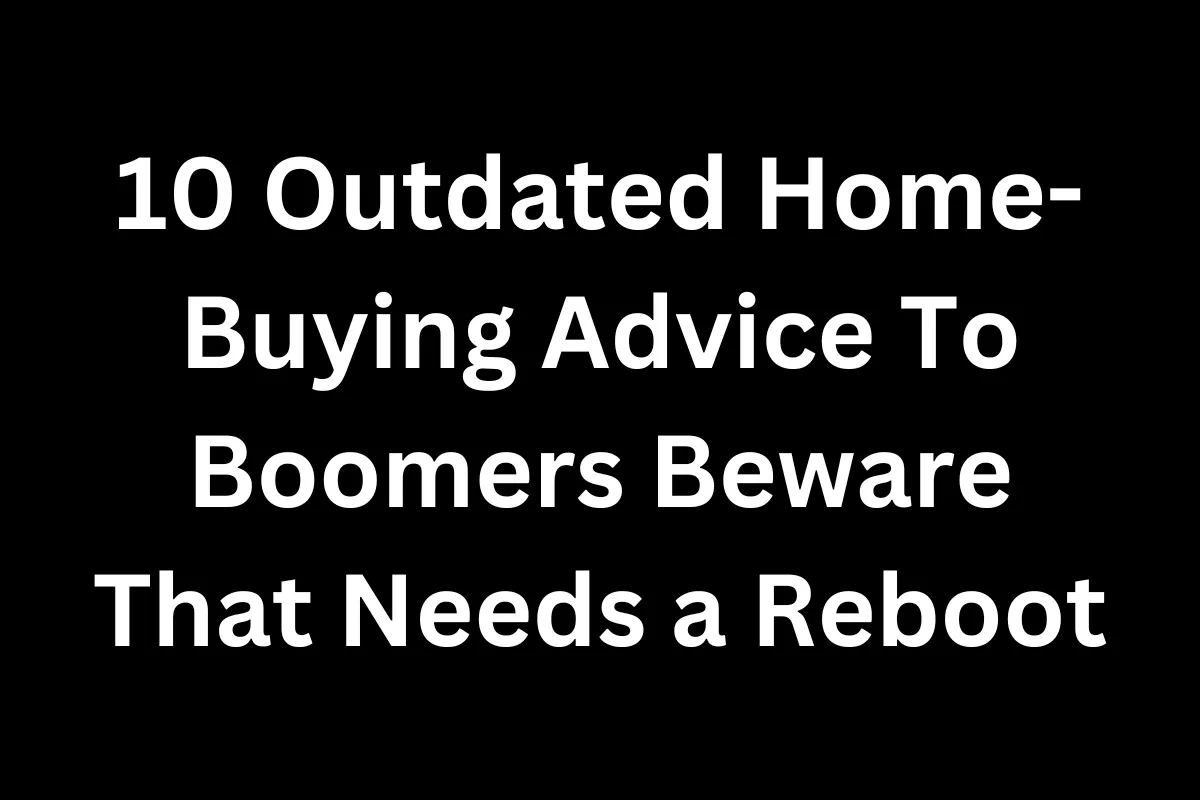Buying a home is a milestone, but as the housing market evolves, so should the advice.
Boomers, beware of outdated home-buying wisdom that might lead you astray.
In this guide, we’re debunking ten pieces of advice that need a reboot, ensuring you make informed decisions in today’s real estate landscape.
The Myth of the 20% Down Payment
The Reality Check
Gone are the days when a hefty 20% down payment was the golden rule.
With various loan programs and changing market dynamics, exploring options like FHA or VA loans can make homeownership more accessible without draining your savings.
“Buy the Worst House in the Best Neighborhood”

The Fixer-Upper Fallacy
While renovating can add value, buying a total fixer-upper may not be the smartest move.
Consider the time, effort, and hidden costs involved.
Sometimes, opting for a move-in-ready home in a growing neighborhood is a more practical investment.
“You’ll Always Build Equity”
The Equity Assumption
The notion that homeownership guarantees automatic equity growth isn’t foolproof.
Market fluctuations and economic downturns can impact property values.
It’s essential to view homeownership as a long-term investment and not solely as a short-term wealth builder.
“Don’t Bother with a Home Inspection”

The Inspection Oversight
Skipping a home inspection is a gamble.
The cost may seem like an extra burden, but it can uncover potential issues, saving you from significant expenses down the line.
It’s a small investment for peace of mind and negotiating power.
“You Can Time the Market Perfectly”
The Crystal Ball Conundrum
Attempting to time the real estate market perfectly is akin to predicting the weather with absolute certainty.
Market conditions are unpredictable, and trying to buy at the absolute lowest point may result in missed opportunities.
Focus on long-term value and stability.
“Your Dream Home Is Non-Negotiable”

The Flexibility Factor
While it’s great to have a vision for your dream home, being overly rigid can lead to missed opportunities.
Stay open to compromises and consider homes with the potential for customization.
You might find unexpected gems that fit your needs.
“Bigger Is Always Better”
The Size Sensibility
The mindset that bigger homes are always better isn’t universally true.
Assess your actual needs and lifestyle.
A smaller, well-designed space can offer more comfort and functionality than a sprawling house that feels empty and burdensome.
“Your Credit Score Is the Sole Deciding Factor”

The Credit Crunch Clarification
While a good credit score is crucial, it’s not the only factor lenders consider.
Your debt-to-income ratio, employment history, and overall financial health play pivotal roles.
Boomers should focus on a holistic financial profile rather than fixating solely on credit scores.
“Only Millennials Need to Embrace Technology”
The Tech-Savvy Reality
The belief that technology is for the younger generation is outdated.
Embrace digital tools and online resources in your home search.
Virtual tours, online listings, and real estate apps can simplify the process, making it efficient for everyone, regardless of age.
“Always Offer Below Asking Price”

The Negotiation Nuance
While negotiating is part of the game, assuming that offering below asking price is the only strategy can backfire.
In a competitive market, a well-priced home may warrant a full or even over asking price offer.
Evaluate each situation individually.
“Location Doesn’t Matter As Much for Resale”
The Resale Reality Check
Choosing a home in a desirable location remains critical for resale value.
Trends may change, but proximity to amenities, good schools, and a safe neighborhood will always be attractive to potential buyers.
“You Can Skip the Real Estate Agent”

The Agent Advantage
Thinking you can navigate the complex real estate process solo is a misconception.
A qualified real estate agent brings experience, market knowledge, and negotiation skills to the table.
Their expertise can save you time, money, and potential pitfalls.
Conclusion
As Boomers embark on the journey of home buying, it’s crucial to debunk outdated advice and embrace a more nuanced approach.
The real estate landscape has evolved, and so should your strategies.
By staying informed and adaptable, you’ll navigate the market with confidence.
FAQs
Q1: Can I buy a home with less than a 20% down payment?
Yes, many loan programs allow for smaller down payments, such as FHA and VA loans. Explore options that align with your financial situation.
Q2: Is it worth paying for a home inspection?
Absolutely. A home inspection can uncover potential issues, giving you a clearer picture of the property’s condition and allowing for informed decisions.
Q3: Should I wait for the market to hit a low point before buying?
Timing the market perfectly is challenging. Focus on long-term value and stability rather than attempting to predict market lows.
Q4: Can I negotiate the price of a move-in-ready home?
Yes, negotiation is possible for move-in-ready homes. Sellers may be open to concessions or adjustments based on market conditions.
Q5: Is it essential to use a real estate agent?
While not mandatory, a qualified real estate agent brings valuable expertise to the table. They can streamline the process, negotiate on your behalf, and provide insights into the market.



